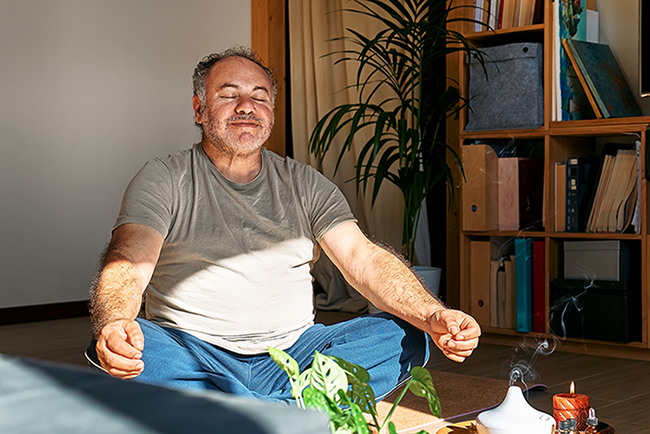Use self-compassion to succeed with exercise
Changing habits is rarely just a matter of willpower – the way you talk to yourself makes a big difference. Through self-compassion, you can build motivation that lasts over time and makes exercise more joyful, not filled with guilt.

Use self-compassion to succeed with exercise
Many people who try to lose weight know how tough their inner dialogue can be. Instead of feeling motivated, self-criticism often arises with feelings of not being good enough or not having the energy. Thoughts like “I should work out more,” “I have no discipline,” “I’m too lazy,” or “I always fail to stick to new routines” are common and many people believe these thoughts will drive them forward. But in reality, they often have the opposite effect: shame, stress, and avoidance.
Research shows that self-criticism can activate the body’s stress system – the same system that responds to physical danger – making it harder to take on new challenges. Self-compassion, on the other hand, activates the safety system and creates motivation based on care, not fear (Neff, 2023).
Practising self-compassion isn’t about lowering your standards. It’s about facing setbacks and challenges in a way that helps you keep going. It also means pausing to check in with how you feel and being aware of your emotions and bodily signals when you practise self-compassion during weight loss.
Self-compassion – what does it really mean?
Self-compassion means treating yourself with kindness, understanding, and acceptance – especially when you’re struggling, failing, or feeling inadequate. Three core components are often described as:
- Self-kindness: Being warm and understanding towards yourself instead of judgemental.
- Common humanity: Reminding yourself that everyone struggles sometimes – you’re not alone in losing motivation, doubting yourself, or feeling inadequate.
- Mindfulness: Noticing your thoughts and feelings without exaggerating or suppressing them.
When these principles are applied to exercise and weight loss, they become powerful tools for lasting change. Self-compassion can also be used specifically to handle challenges and setbacks in your weight-loss journey.
How self-criticism sabotages positive change
Self-criticism can temporarily create pressure to perform – “I really need to get it together now!” – but in the long run, it often leads to avoiding exercise altogether.
For example: you plan to go to the gym but miss your session. An inner critical voice says, “Typical me, I can never stick to routines.” That type of thought triggers shame and disappointment. When exercise becomes associated with these feelings, it turns into a reminder of failure – not something to look forward to. Over time, this undermines both motivation and self-esteem. It can also trigger all-or-nothing thinking: “If I can’t do it perfectly, I might as well give up.”
Self-compassion breaks that cycle by creating psychological safety. When you meet your setbacks with kindness, shame decreases – freeing up energy to try again.
Setting goals with self-compassion
Setting goals with self-compassion means giving yourself space to grow and develop without getting stuck in harsh self-criticism. When setting exercise goals, it’s important that they feel realistic and meaningful – not because you should, but because you want to feel better and develop.
By using self-compassion in goal-setting, you reduce stress and boost self-esteem because you allow yourself to be human, even when things don’t go as planned. Start by setting small, specific goals you can actually achieve. It might mean training once more per week or trying a new activity that feels enjoyable.
When you reach a goal, praise yourself – it boosts motivation and makes you want to continue. If you face obstacles, remind yourself that it’s a natural part of the process and that each experience can teach you something new. Self-compassion helps you see setbacks as opportunities to grow rather than proof that you’re not good enough.
By setting goals with self-compassion, you create an inner environment where you feel safe to try, fail, and try again. This helps you stick with your exercise routines and achieve the changes you want in a way that strengthens both your motivation and wellbeing.
Exercise that builds motivation – not guilt
Research shows that people who approach their goals with self-compassion have greater endurance, experience less performance anxiety, and recover faster from setbacks (Neff, 2023). They also tend to set more realistic exercise goals and maintain them over time.
Exercising with self-compassion doesn’t mean always feeling motivated – it means showing up even when you don’t do it perfectly.
Example: You plan a 45-minute workout but feel tired after work. Instead of thinking, “I’m useless for not having the energy,” you can say: “I’m tired today – that’s okay. I’ll do 15 minutes at home, and that’s still something good for me.”
This shift – from performance to intention – makes exercise more sustainable and less stressful.
Self-compassion in practice – three exercise strategies
1. Exercise to care for your body, not to punish it
Many people start exercising to “compensate” for eating or to change their appearance. That kind of motivation can work short term but often creates an unhealthy relationship with exercise. Try instead to view each session as an act of care: you’re strengthening your body, sleeping better, increasing energy, releasing endorphins that boost mood, and improving health.
A simple mental exercise: ask yourself before each session – “What does my body need today?” Sometimes the answer is high intensity; sometimes it’s a walk. Self-compassion helps you listen to your body’s signals without losing focus.
2. Be flexible – adapt your training instead of giving it up
A common obstacle in weight loss is overly strict planning – creating a schedule that doesn’t allow for life’s ups and downs. When something goes wrong – a missed session, illness, or stress – many feel they’ve lost their rhythm and that all progress is ruined.
Self-compassion helps you make room for the human element and start again without guilt.
Example: You plan three sessions a week but miss two. Instead of thinking, “It’s ruined,” you can say: “I got one session in this week – good job anyway. I’ll aim for two next week.”
That’s resilience – the ability to bounce back from setbacks – and it’s key to creating sustainable change.
3. Celebrate what you do, not just what you plan to do
Many people focus on what they haven’t done: “I didn’t run today,” “I skipped the gym.” But the brain responds more constructively to encouragement and recognition than to criticism. Noticing even small achievements strengthens the brain’s reward system, making it easier to repeat positive behaviours.
Examples of self-affirming thoughts:
“I went for a walk even though I didn’t feel like it – that shows I’m taking care of myself.”
“I stopped my workout when I felt dizzy – that was smart, not lazy.”
“I didn’t train yesterday, but I’m planning a short session today – that’s enough.”
Self-compassion as protection against stress and relapse
During a weight-loss journey, it’s normal for motivation to fluctuate. Periods of stress, illness, or lack of sleep can reduce both energy and willingness to exercise. In these situations, self-compassion acts as a psychological safety net.
Studies show that people with high self-compassion:
- return more quickly to healthy habits after setbacks,
- feel less shame after lapses, and
- have greater confidence in their ability to start again.
In other words, self-compassion strengthens your belief in your own ability to make progress – and that belief is crucial for continuing to exercise even when results are slow to appear.
How to start exercising with self-compassion – a step-by-step guide
- Identify your inner critic
Notice how you talk to yourself when you miss a session. Are your words encouraging or judgemental? - Change perspective – speak to yourself like a friend
Ask yourself: “If a friend said this about themselves, what would I say?” This technique – often called compassionate reframing – is simple but powerful. - Set realistic expectations
Exercise for weight loss doesn’t need to be perfect. Two short walks and some bodyweight exercises at home are better than a plan you never manage to follow. - Create a ‘restart plan’
Decide in advance how you’ll handle setbacks. For example: “If I miss two sessions, I’ll go for a walk and reschedule without judging myself.” - Integrate micro-rewards
Link exercise to things you enjoy – favourite music, fresh air, or a sense of pride. The more you associate training with positive experiences, the stronger it becomes as a habit.
Just as the body strengthens through movement, motivation strengthens through kindness. When you exercise with care for yourself, change becomes more sustainable over time.
Want practical habit-building tips? Read Find your best workout for weight loss – how to build habits that last
Final thoughts
Losing weight and changing your lifestyle isn’t just about knowledge, exercise, and diet. The journey is individual, and things might not always go as planned. It’s also about how you talk to yourself along the way.
Self-compassion isn’t an obstacle to discipline – it’s the foundation for staying disciplined over time. It’s about finding the right balance between determination and kindness, and remembering that you’re allowed to be gentle with yourself in the process.
So next time you hear that inner voice saying, “I should have trained more,” try replying:
“I’m doing the best I can right now – and that’s enough.”
That’s how change becomes sustainable – not by pushing harder, but by supporting yourself better.
Treating yourself with kindness isn’t giving up – it’s giving yourself the strength to continue.
Reference:
Neff, K. D. (2023). Self-Compassion: Theory, Method, Research, and Intervention. Annual Review of Psychology, 74, 193–218.

October 13, 2025
December 4, 2025
Start your weight loss journey with Yazen today
Everything you need to do is to create an account and answer some questions about your health
.svg)
.svg)
More articles
How to reduce the risk of loose skin after weight loss
Weight loss can bring significant positive changes for both health and wellbeing. At the same time, many people experience loose skin after substantial weight loss, especially if the weight has decreased rapidly or if they have lived with overweight or obesity for a long time.
Loose skin is a natural result of changes in the skin’s elasticity as the body adjusts. By understanding how the skin is affected after weight loss and which factors influence its elasticity, you can give the skin better conditions to tighten and feel firmer again.
Losing weight after pregnancy – advice for new mothers
Losing weight after pregnancy is an individual process that looks different for everyone. For some, the weight decreases gradually and with little effort, while others find that it doesn’t decrease as expected despite healthy eating and exercise habits. How easy or difficult it is to lose weight depends on several factors, including how much weight you gained during pregnancy, your pre-pregnancy weight, diet, physical activity, genetics, and sleep.




.svg)

















